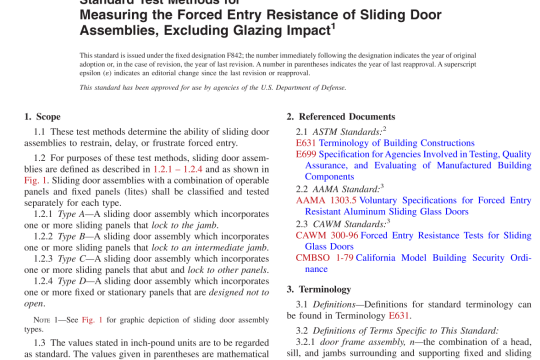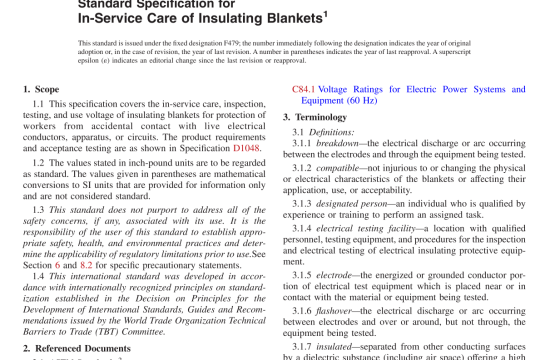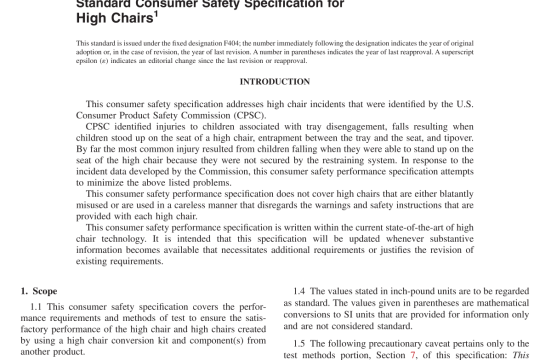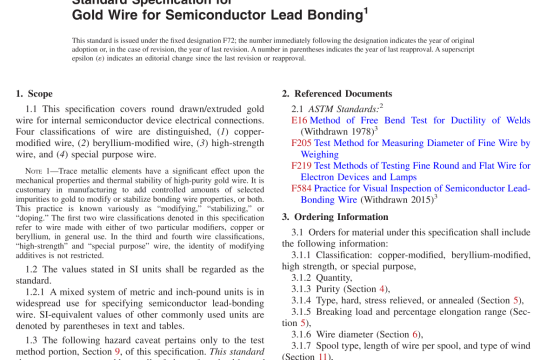ASTM C973-87(R2020) pdf free download
ASTM C973-87(R2020) pdf free download.Standard Practice for Preparing Test Specimens from Basic Refractory Gunning Products by Pressing
1. Scope
1.1 This practice covers a procedure for preparing test specimens from basic refractory gunning products by pressing prepared material in a mold. After pressing, test specimens prepared from dolomitic mixes are subjected to a prescribed heat treatment. Specimens prepared in accordance with this procedure are intended for use in ASTM test methods. 1.2 The values stated in inch-pound units are to be regarded as standard. The values given in parentheses are mathematical conversions to SI units that are provided for information only and are not considered standard. 1.3 This standard does not purport to address all of the safety concerns, if any, associated with its use. It is the responsibility of the user of this standard to establish appro- priate safety, health, and environmental practices and deter- mine the applicability ofregulatory limitations prior to use. 1.4 This international standard was developed in accor- dance with internationally recognized principles on standard- ization established in the Decision on Principles for the Development of International Standards, Guides and Recom- mendations issued by the World Trade Organization Technical Barriers to Trade (TBT) Committee.
2. Significance and Use
2.1 This practice defines a procedure that ensures consistent preparation of specimens for product testing and evaluation. 2.2 This practice can be used in the laboratories of producers, users, and general-interest parties for research and development or quality-control work. It is particularly useful for interlaboratory comparisons on products, for repetitive evaluations or comparisons of products or product equality, and in specifying a uniform preparation practice for specimens for acceptance testing. 2.3 In using this practice, it must be recognized that the structure of laboratory-pressed specimens may differ signifi- cantly from the structure of material gunned in field applica- tions.
4. Procedure
4.1 Store the material to be tested at 85 6 2 °F (29.5 6 1 °C) for 24 h prior to testing. Dolomitic materials should be stored in airtight containers. 4.2 Reduce the sample to the desired batch size with a sample splitter or by quartering, taking precautions to prevent segregation. Sufficient material should be batched to provide at least a 10 % excess over test specimen requirements. 4.3 Add the weighed, dry batch to the mixer and dry-mix at low speed for 30 s. Continue to mix at low speed while adding the required amount of water (see 4.3.1) within 30 s. Wet-mix at low speed for 3 min. 4.3.1 Use the amount of water and mixing time (if different from above) recommended by the manufacturer. The water must be potable and at a temperature of 85 6 2 °F (29.5 6 1 °C). Measure the water addition to the nearest 0.1 % by weight. 4.4 Specimens of the desired size should be pressed imme- diately after the batch is mixed. Weigh the proper amount of material (see 4.4.1) for each specimen to the nearest 0.02 lb (10 g), and distribute the mix uniformly in the mold using the narrow edge ofa trowel. (The remainder ofthe batch should be covered with a damp cloth during the pressing procedure.) Press test specimens at 1800 psi (12.41 MPa). 4.4.1 Some products contain hydratable materials (for example, dead-burned dolomite) or quick-setting bonds, or both, that tend to react during the course of pressing several specimens from a single wet-mixed batch. Because of this reaction, the physical properties of specimens pressed near the beginning of a batch may differ from those of specimens pressed near the end. Products of these types should be mixed in small batches to minimize this effect. 4.5 Test specimens prepared from mixes that do not contain dolomite should be air-dried for 4 h, and then dried for a minimum of 8 h at 225 6 5 °F (107 6 2.5 °C) in a circulating air dryer prior to testing. Testing should be carried out within 48 h. 4.6 Test specimens prepared from dolomitic mixes require special handling to prevent hydration. Place the test specimens in a furnace at 1830 °F (1000 °C) immediately after pressing and soak for a minimum of 2 h. Then remove them from the furnace before it has cooled below 1100 °F (593 °C), cool in air for a maximum of 2 h, and store in a desiccator or nitrogen-purged box prior to testing. Testing must be per- formed within 48 h, taking precautions to prevent hydration.




